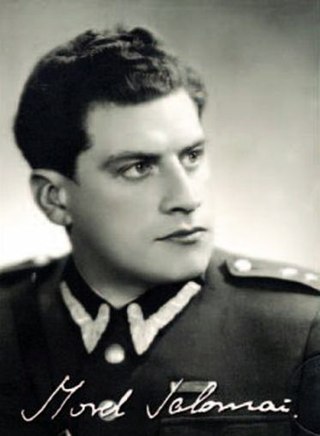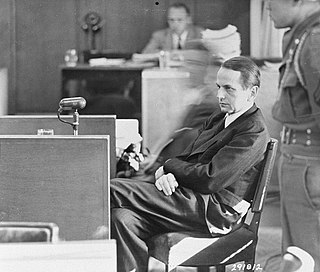Related Research Articles

The Jedwabne pogrom was a massacre of Polish Jews in the town of Jedwabne, German-occupied Poland, on 10 July 1941, during World War II and the early stages of the Holocaust. Estimates of the number of victims vary from 300 to 1,600, including women, children, and elderly, many of whom were locked in a barn and burned alive.

Gerda Steinhoff was a Schutzstaffel (SS) Nazi concentration camp overseer following the 1939 German invasion of Poland.

Salomon Morel was an officer in the Ministry of Public Security in the Polish People's Republic, and a commander of concentration camps run by the NKVD and communist authorities until 1956.

Righteous Among the Nations is an honourific used by the State of Israel to describe all of the non-Jews who, for purely altruistic reasons, risked their lives in order to save Jews from being exterminated by Nazi Germany during the Holocaust. The term originates from the concept of ger toshav, a legal term used to refer to non-Jewish observers of the Seven Laws of Noah.
Marek Jan Chodakiewicz is a Polish-American historian specializing in Central European history of the 19th and 20th centuries. He teaches at the Patrick Henry College and at the Institute of World Politics. He has been described as conservative and nationalistic, and his attitude towards minorities has been widely criticized.
Valerian Trifa was a Romanian Orthodox cleric and fascist political activist, who served as archbishop of the Romanian Orthodox Episcopate Of America. For part of his life, he was a naturalized citizen of the United States, until he was stripped of his American citizenship for lying about his involvement in the murder of hundreds of Jews during the Holocaust and World War II.
Holocaust trivialization refers to any comparison or analogy that diminishes the scale and severity of the atrocities that were carried out by Nazi Germany during the Holocaust. The Wiesel Commission defined trivialization as the abusive use of comparisons with the aim of minimizing the Holocaust and banalizing its atrocities. Originally, holocaust meant a type of sacrifice that is completely burnt to ashes; starting from the late 19th century, it started to denote extensive destruction of a group, usually people or animals. The 1915 Armenian genocide was described as a "holocaust" by contemporary observers.

Hotel Polski, opened in 1808, was a hotel in Śródmieście, Warsaw, Poland, at 29 Długa street.

Seweryna Maria Szmaglewska was a Polish writer, known for both books for children and adults alike, and an inmate of the Auschwitz-Birkenau concentration camp during World War II. Her novels Czarne Stopy and Dymy nad Birkenau are compulsory reading in Polish schools.
The Amendment to the Act on the Institute of National Remembrance of 2018 is a partly repealed Polish law that criminalized public speech attributing responsibility for the Holocaust to Poland or the Polish nation; the criminal provisions were removed again later that year, after international protests. Article 2a, addressing crimes against "Polish citizens" by "Ukrainian nationalists", also caused controversy. The legislation is part of the historical policy of the Law and Justice party which seeks to present a narrative of ethnic Poles exclusively as victims and heroes. The law was widely seen as an infringement on freedom of expression and on academic freedom, and as a barrier to open discussion on Polish collaborationism, leading to what has been described as "the biggest diplomatic crisis in [Poland's] recent history".
Alexander Victor Prusin (born Lviv, Ukraine; was a professor of history at the New Mexico Institute of Mining and Technology from 2001 to 2018. He specialized in the history of Russia and Eastern Europe, nationalism, ethnic conflict, and genocide.

Genocide justification is the claim that a genocide is morally excusable or necessary, in contrast to genocide denial, which rejects that genocide occurred. Perpetrators often claim that the genocide victims presented a serious threat, meaning that their killing was legitimate self-defense of a nation or state. According to modern international criminal law, there can be no excuse for genocide.

Jewish collaboration with Nazis refers to the activities before and during World War II of a small number of Jewish persons working, voluntarily or involuntarily, with the anti-Semitic regime of Nazi Germany, with different motivations. The term and history have remained controversial, regarding the exact nature of "collaboration" in some cases.
After World War II and coming to power of the communist government in Poland, large scale nationalization occurred. Following the fall of communism in Poland in 1989, some of the formerly nationalized property have been subject to reprivatisation and restored to previous owners, their heirs or other claimants.
Rebecca Clifford is a Canadian historian and professor of history, focusing on contemporary European history, oral history, memory, and Holocaust historiography. Her 2020 book, Survivors, was won the 2021 Canadian Jewish Literary Award for Scholarship and has been nominated for a number of awards including the Cundill Prize, the Wingate Prize, the Wolfson History Prize, and the Baillie Gifford Prize for Non-Fiction.

Paul Otto Geibel was a German SS-Brigadeführer and Generalmajor of police who served as the last SS and Police Leader (SSPF) "Warsaw" during the Second World War. He was involved in suppressing the Warsaw Uprising and in the subsequent destruction of the city. At the end of the war, he was convicted of war crimes and committed suicide while serving a life sentence in Poland.
This is a select bibliography of English language books and journal articles about the history of Poland during World War II. A brief selection of English translations of primary sources is included. Book entries have references to journal articles and reviews about them when helpful. Additional bibliographies can be found in many of the book-length works listed below; see Further Reading for several book and chapter-length bibliographies. The External Links section contains entries for publicly available select bibliographies from universities. This bibliography specifically excludes non-history related works and self-published books.
The August Trials: The Holocaust and Postwar Justice in Poland is a book by Andrew Kornbluth, published in 2021 by Harvard University Press.
Samuel Rajzman (1902–1979) was a Polish Holocaust survivor. After the war he emigrated to France and then to Canada. He was one of the two Polish witnesses at the Nuremberg Trials. He was also a witness at the Treblinka trials and during the process of Fiodor Fedorenko.
References
- ↑ "Department of Germanic Languages & Literatures". german.as.virginia.edu. Retrieved 23 December 2020.
- ↑ Rossoliński-Liebe, Grzegorz (2017). "Laura Jockusch and Gabriel N. Finder, eds, Jewish Honor Courts: Revenge, Retribution, and Reconciliation in Europe and Israel after the Holocaust". European History Quarterly. 47 (2): 358–359. doi:10.1177/0265691417695979u.
- ↑ Laura Jockusch and Gabriel N. Finder (eds.), Jewish Honor Courts: Revenge, Retribution, and Reconciliation in Europe and Israel after the Holocaust. Detroit: Wayne State University Press, 2015. 387 pp. Richard I. Cohen DOI:10.1093/oso/9780190912628.003.0014
- ↑ Abraham, David (2017). "Jewish Honor Courts: Revenge, Retribution, and Reconciliation in Europe and Israel after the Holocaust. Ed. Laura Jockusch and Gabriel Finder . Detroit: Wayne State University Press, 2015. vii, 387 pp. Notes. Bibliography. Index. Illustrations. Plates. $38.99, paper". Slavic Review. 76 (1): 221–223. doi:10.1017/slr.2017.29.
- ↑ Rapaport, Lynn (2016). "Jewish Honor Courts: Revenge, Retribution, and Reconciliation in Europe and Israel after the Holocaust". Holocaust and Genocide Studies. 30 (3): 553–556. doi:10.1093/hgs/dcw070.
- ↑ "Jasiński on Finder and Prusin, 'Justice behind the Iron Curtain: Nazis on Trial in Communist Poland' | H-Poland | H-Net". networks.h-net.org. Retrieved 23 December 2020.
- ↑ Meng, Michael (2020). "Justice Behind the Iron Curtain: Nazis on Trial in Communist Poland . By Gabriel N. Finder and Alexander V. Prusin. German and European Studies, volume 32. Edited by Jennifer J. Jenkins.Toronto: University of Toronto Press, 2018. Pp. xvi+380. $90.00 (cloth); $34.95 (paper or e-book). Reckonings: Legacies of Nazi Persecution and the Quest for Justice . By Mary Fulbrook.New York: Oxford University Press, 2018. Pp. xiii+658. $34.95". The Journal of Modern History. 92 (2): 463–465. doi:10.1086/708588.
- ↑ Exeler, Franziska (2020). "Justice behind the Iron Curtain: Nazis on Trial in Communist Poland. By Gabriel N. Finder and Alexander V. Prusin. Toronto: University of Toronto Press, 2018. xiv, 377 pp. Notes. Bibliography. Index. Illustrations. Photographs. Maps. $34.95, paper". Slavic Review. 79 (1): 194–195. doi:10.1017/slr.2020.25.